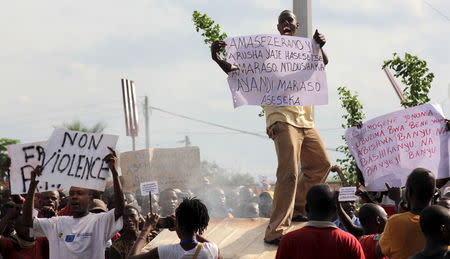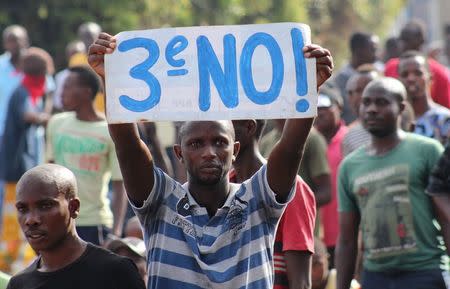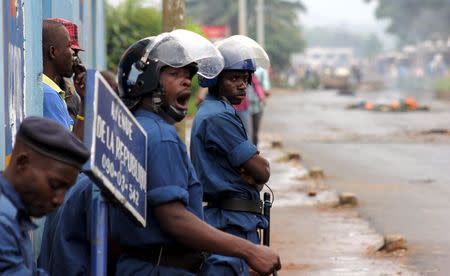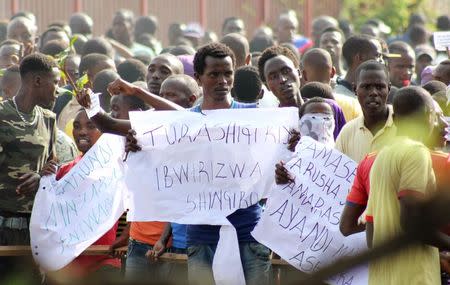Almost 40,000 flee Burundi amid political crisis
By Patrick Nduwimana BUJUMBURA (Reuters) - Nearly 40,000 refugees have fled Burundi to neighboring Rwanda, Tanzania and the Democratic Republic of the Congo in the last month, amid protests against President Pierre Nkurunziza's bid for a third term, the United Nations said on Wednesday. A total of 16 people were injured in protests held in different parts of the capital on Wednesday, the Burundi Red Cross said. More than a week of demonstrations have plunged the African nation into its worst crisis since an ethnically charged civil war ended in 2005. Civil society groups say a dozen people have been killed. Police say the death toll is half that number. The opposition says Burundi's constitution and a peace deal that ended the civil war limits Nkurunziza to two terms. But Burundi's constitutional court this week cleared the way for the president to run again in June, saying his first term did not count because he was picked by parliament not publicly elected. Chauvineau Mugwengezo, spokesman for the alliance for Democratic Change, a coalition of five opposition parties rejecting Nkurunziza's bid for the third term, accused their opponents of causing most of Wednesday's injuries. "Imbonerakure (youth affiliated to the ruling party) attacked peaceful demonstrators at Kanyosha, a dozen were wounded by hand grenades thrown by the young members of CNDD-FDD party," Mugwengezo said. The chairman of the CNDD-FDD youth wing league, denied the accusations, saying no youth were involved in the violence. "We have never called our young members to retaliate against the protesters. In case there are some who are implicated in violence pretending to be "Imbonerakure", those should be pursued and punished for their acts," Denis Karera said. The U.N. refugee agency UNHCR said 39,091 Burundians had sought asylum in neighboring states since the start of April. At least 24,795 had gone to Rwanda, Tanzania had taken in 6,966 people and 7,319 have fled to Congo. The number has been rising steadily on a daily basis, and diplomats say many people have left to stay with relatives in neighboring states and are not being registered as refugees in host countries. Jan Egeland, the head of the Norwegian Refugee Council and the former top humanitarian official for the United Nations, called for international action to avoid a catastrophe in Burundi. "All lights are blinking in Burundi. All alarms are going. So where's the fire brigade," Egeland told a news conference in Geneva. The unrest has particularly worried Rwanda, still scarred by its 1994 genocide that killed more than 800,000 Tutsis and moderate Hutus. Burundi has a similar ethnic mix. Nkurunziza, a former Hutu rebel leader, says the demonstrations are an "insurrectional movement". (Additional reporting by Tom Miles in Geneva; Writing by Edith Honan; Editing by Ralph Boulton)








